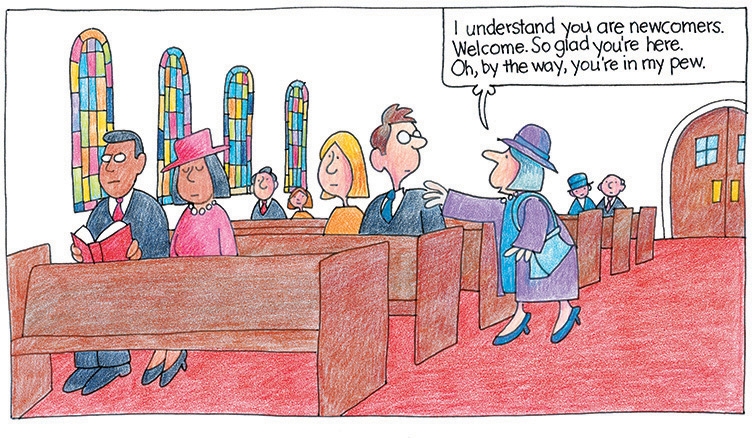I was glad when the movers finally carried our piano into our living room, but somehow we couldn’t locate the box with sheet music. So I decided I’d go shopping, finding something simple I could play. At the time, I was new in town as I went looking for a music store. I saw a likely spot in a strip mall. I noted as I approached that the place looked kind of dark.
As I walked in, I could immediately tell that I wasn’t going to find Bach Inventions or Chopin Nocturnes. This was really heavy metal. Really heavy. A few unfriendly faces behind the counter gave me the once over. They checked out my clerical collar, and deduced that I was probably not their target audience. The total effect of the place was to make me feel that I didn’t belong. I took a quick tour of the merchandise, feigned interest and made a hasty exit. I ordered music online.
But I have thought about my experience in that store. I wondered if people ever feel like that in church. I wonder if people ever summon the courage to walk through red doors, dare to believe ubiquitous signs: “The Episcopal Church welcomes you”, find themselves in a pew and feel they don’t belong. Maybe they can’t figure out which book to use. Maybe they need a coach in liturgical aerobics. Maybe they feel under-dressed. Maybe they make their way to coffee hour, where a friendly gaggle of congregants talk to each other in friendly huddles as newcomers orbit the periphery, looking at dated bulletin boards, feigning interest in printed materials, checking out clouds in the coffee, the way I faked my way through the music store.
As you may know, I vent by cartoon. One of the cartoons that gets a lot of Episco-response depicts a young couple awaiting an 8am eucharist. They are seated by the aisle, though the church seems pretty empty. A well-dressed elderly woman approaches, perhaps a pillar of the parish. She taps the young man on the shoulder and says: “You look like you’re new. Welcome to our church. Oh by the way, you’re in my pew.”
This cartoon appeared on some Facebook page. A person commented that it was dumb, that the artist was feeding an unfair caricature of the Episcopal Church. The comment: “That would never really happen.” Almost immediately, from all over the country, people responded that they had had exactly that experience. I wondered if that imaginary (or perhaps real) couple felt like I felt in that dark music store.
We sometimes sing in our church this hymn: “All are welcome in this place.” It’s a wonderful biblical aspiration, with roots in ancient Israel instructed to welcome the stranger, all the way to the gospels, where Jesus says: ‘Whoever welcomes you welcomes me, and whoever welcomes me welcomes the one who sent me.”(Matthew 10:40), all the way to the end of Paul’s letter to the Romans where he says: “Welcome one another as Christ has welcomed you, for the glory of God.”
Fact is, we are all strangers (some stranger than others). We all probably share Woody Allen’s angst, noted in his refusal to attend football games because he was convinced that in the huddle they were talking about him. We all probably have moments, individually and collectively, when we fail to welcome as Christ has welcomed us.
Spiritually vital congregations are able to get people moving in the spiritual journey. That begins with welcome. What are the welcoming opportunities available to you? When this week will you have the chance to practice hospitality, in church or outside of church? What would it mean for us to welcome one another as Christ has welcomed us?
-Jay Sidebotham
|
Let all guests who arrive be received like Christ, for he is going to say, “I came as a guest, and you received me.” -The Rule of St. Benedict
A story said to originate in a Russian Orthodox monastery has an older monk telling a younger one: “I have finally learned to accept people as they are. Whatever they are in the world, a prostitute, a prime minister, it is all the same to me. But sometimes I see a stranger coming up the road, and I say, ‘Oh, Jesus Christ, is it you again?'”
-Kathleen Norris, Dakota
For the Lord your God is God of gods and Lord of lords, the great God, mighty and awesome, who … defends the cause of the fatherless and the widow, and loves the alien, giving him food and clothing.
-Deuteronomy 10:17-18
Be kind, for everyone you meet is fighting a great battle.
-Philo of Alexandria, quoted in Dan Wakefield, How Do We Know When It’s God?
That is our vocation: to convert … the enemy into a guest and to create the free and fearless space where brotherhood and sisterhood can be formed and fully experienced.
-Henri J. M. Nouwen, Reaching Out: The Three Movements of the Spiritual Life
|

Discipleship Matters Conference 2017
Oct. 16-18, 2017
 Contact:
Contact:
Rev. Jay Sidebotham
jsidebotham@renewalworks.org
RenewalWorks is a ministry of Forward Movement.
www.renewalworks.org
If you’d like to join in this donor-based ministry, donate here.


